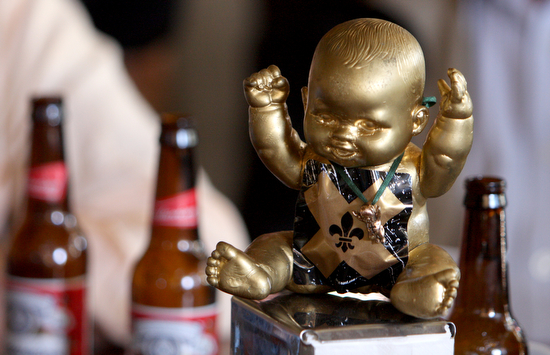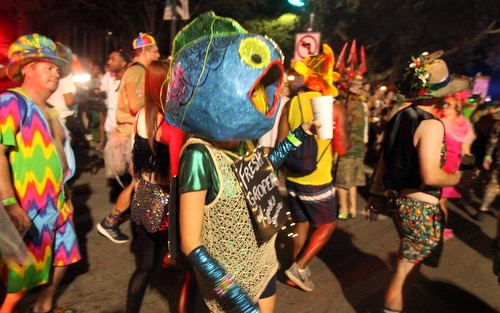
Uptown Messenger file photo
People tend to let their guard down during game day and Mardi Gras celebrations.
By Stephanie Knapp, guest columnist
On a Monday night in November, the Pelicans were playing the Warriors at the Smoothie King center. It was chilly outside, with an early sunset thanks to daylight savings time. My fav neighborhood bar — with its craft beer, reliable big screens, and low-key, cozy vibe — was the perfect place to tune in. I’d watched games there often enough, usually accompanied by my writing or a novel for multitasking during timeouts. But that evening, I ended up leaving early. That evening, I was drugged.
Stop me if you’ve heard this one before. College girl can’t remember the fella who handed her that drink. Or this one: woman at a Mardi Gras celebration leaves drink unattended while she uses the bathroom. How about this one: woman in oversized sweater orders one beer at a small Uptown bar, then doesn’t leave her seat or her drink alone — but ends up being discharged from Touro hospital at 2 a.m. with a diagnosis of “altered mental state.”
In the days immediately after, I tried to sew events into cohesion, figure out not only what had happened, but who the guy had been. A stranger, yes. My notes say things like:
Polite. Normal. Bland.
Offered to buy me a drink — “no thanks” and “I’m leaving soon.”
Talked about Francophone grandparents after observing my French book.
A mention of a girlfriend (disarming move to lull me into “safe” conversation), of a house destroyed in Ida (sympathy play).
But any other particulars I try to graft onto the evening, especially faces, are a maddening black hole. My day job as elementary teacher has me doing fractions and long division. My evenings are often spent in writing mode, where I get to focus on details and structure. I know when particulars matter. One of the worst features of the assault — it took me months to realize that when someone robs you of your body for a few hours that’s what you call it — is that most of my memories of the evening after about 8:40 p.m. exist simply as colors.
No matter the effort, all I see when I search for details of this person is gray and a small patch of what I’d call burnt umber. I’m guessing that the orangey color was something on his shirt (Was he wearing a hat? A jacket?). The other details can be corroborated by friends and time stamps on texts and hospital documents.
Late November and December found me mostly pretending it hadn’t happened. Other than a few days of shakiness and agoraphobia, I was mostly successful. Then the bills started coming in.
I know how I got to the hospital. My friend told me. But to me, the last fully formed event chain was in the game’s third quarter: Pels up by 20+, the mystery assaulter coming up to my seat. I talked, minimally engaged, ducking into my book and an increasing number of turnovers and texting my friend B, who was at the game, and my out-of-state sister.
When I had the uneasy feeling that he was going to ask for my number, my hyper-vigilance began to whisper danger. I was relieved when he finally mentioned he “didn’t want to take my time” but would “be outside” on the patio. The wording was bold and odd enough to make me finish my glass, wait a few minutes out of some weird version of propriety, and leave.

The sedatives that can be slipped into drinks are colorless, odorless and tasteless.
Even though I cannot recall his face at all, the feeling of being watched, of his eyes on me through the patio window as I was leaving, remains. The last clear thought I remember — as I was moving to my car at the fastest clip I could without running — was something I thought of as clever: “If you see a woman watching the game, reading a novel, she’s not there to meet you. She probably just doesn’t have cable.”
The first thing I noticed was almost missing my driveway. My house is only a few blocks away, but that must’ve been the timeframe for the drug to start taking its pronounced effect, 10-15 minutes post-ingestion. I tripped on a stair going into the house. There was the distinct impression of being disproportionately drunk. I downed some peanut butter and bread, but within minutes, I noticed that I could barely read B’s texts from the game. I texted him that something was wrong, then as my last conscious act, called my friend M. I don’t remember her coming into the house. I do remember not wanting to go to the hospital, streetlights popping like silent fireworks along the way. Things I cannot remember: a nurse drawing blood. The passage of time.
Sometime around 1 or 2 a.m., my speech and my body awareness were starting to come back online. I had an IV port in my arm, but no IV. A nurse came in to tell me they were going to take me to a CAT scan, but I realized what was happening and finally said “no.” I wanted to go home. They discharged me back into M’s care; she who drove me home and spent the remainder of the night on my couch because she’s lovely.
Chris Romaguera, who’s spent years working on Frenchmen Street, told me this: “As a friend, as a bartender, I’m hearing about it [druggings] more. Coming out of the Covid years, Mardi Gras — something’s happening right now that’s making people feel like they can get away with it.”
Besides dealing with his own spidey-sense of when something is suspicious, or just off, he’s feeling the pressure. Not only are there immediate legal responsibilities to service, but there are questions of what happens in the bar’s periphery.

Robert Morris, Uptown Messenger file photo
“Part of the terror of Mardi Gras is there’s so much going so right and so wrong at the same time.”
“Being a bartender’s like being a catcher — you can call out plays, you have a different vantage point,” he says. “Part of the terror of Mardi Gras is there’s so much going so right and so wrong at the same time — it’s overwhelming. Reading stuff becomes really hard. There’re so many blind spots, so many people. Reading body language becomes tough.”
These crimes were rising before Carnival. They’re already happening around us. To us. The effects range from physical to mental to financial. As of now, Touro is telling me I owe over $1,600. This would be for bloodwork that came back clean (not even a negligible blood alcohol content, because all I’d had was one beer at around 8 p.m.). At discharge, a nurse mentioned that they only test for a portion of identified roofies, the common term for date-rape drugs. Anecdotal conversations relay that the varietals are super cheap and easily purchased. Screening for all of them must be impossible.
If my body were a car, if I’d been a Civic in a hit-and-run, I’d like to think insurance would’ve helped out more. In any case I would’ve filed a police report (a Touro representative told me that even with a police report, they would’ve billed me the same).
Regardless, crimes like this go massively unreported. Why? There’s the obvious shame, the victim-blaming (no point in asking why I was a target, if it’d been my hairstyle or that oversized sweater). But then there’s the phantom nature of the crime itself, the kind that leaves no evidence, not even in the victim’s memory.
Because I fled so quickly, I spent weeks reasoning that nothing had actually happened. Touro’s minimizing diagnosis — “altered mental state” — also gaslit me into thinking I was crazy, or suddenly alcohol intolerant. But when I got my courage up to drink a beer months later, everything was fine.
When I finally had to reckon with the reality of the bills, I had to reckon with the assault itself. A funny phrase kept piercing me — that I’d been “put in my place.” Now I was just being made financially responsible for my actions. Societal pressure’s working multiple angles here. This is what comes of being a woman in public, of being alone, of not having the platinum-tier insurance. Yada yada.”
“Any time the onus is on the victim, it’s a sign that we’re being lazy and not wanting to do the complicated work,” Romaguera reminded me.
Wouldn’t it be nice to have a safety tip or to end on a tidy, uncomplicated note? But there it is, that responsibility of not only holding ourselves to the pesky truth, but holding our wider community to it as well. Besides asking where I myself have a right to exist without getting assaulted, I cycle back to the bigger picture. Of why so many other souls struggle to claim their rights to exist without being targeted, arrested, violated, even killed. It’s the vortex we live in, even in the midst of our revelry.
Stephanie Knapp writes and teaches in New Orleans.
This happened to my daughter a few years ago while at French Quarter Fest. She was unknowingly drugged as well, while drinking water. Fortunately, a female server spotted her on the say to the restroom and knew something was wrong. My daughter called her boyfriend to come get her. She was lucky. Please, please be very aware of strangers who get their kicks out of doing this horrible deed.